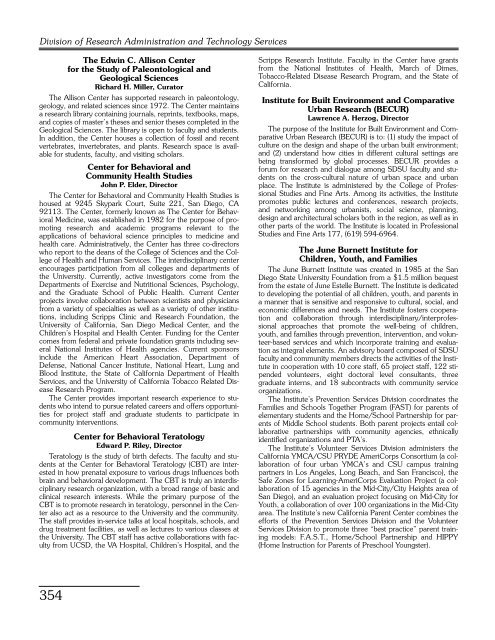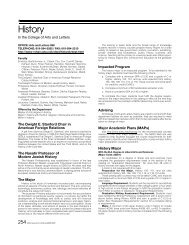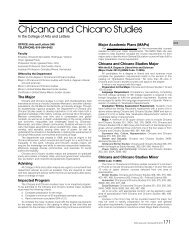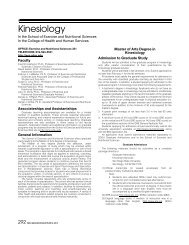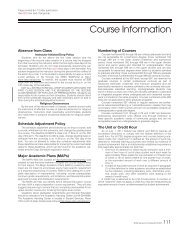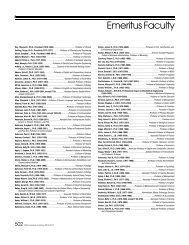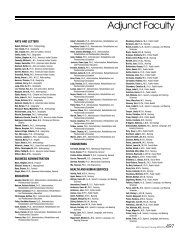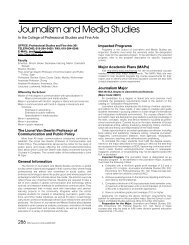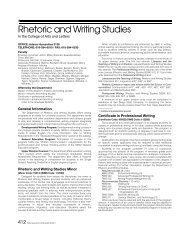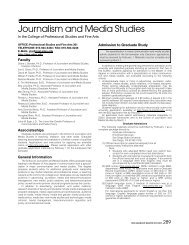President Stephen L. Weber - San Diego State University ...
President Stephen L. Weber - San Diego State University ...
President Stephen L. Weber - San Diego State University ...
You also want an ePaper? Increase the reach of your titles
YUMPU automatically turns print PDFs into web optimized ePapers that Google loves.
Division of Research Administration and Technology Services<br />
The Edwin C. Allison Center<br />
for the Study of Paleontological and<br />
Geological Sciences<br />
Richard H. Miller, Curator<br />
The Allison Center has supported research in paleontology,<br />
geology, and related sciences since 1972. The Center maintains<br />
a research library containing journals, reprints, textbooks, maps,<br />
and copies of master’s theses and senior theses completed in the<br />
Geological Sciences. The library is open to faculty and students.<br />
In addition, the Center houses a collection of fossil and recent<br />
vertebrates, invertebrates, and plants. Research space is available<br />
for students, faculty, and visiting scholars.<br />
Center for Behavioral and<br />
Community Health Studies<br />
John P. Elder, Director<br />
The Center for Behavioral and Community Health Studies is<br />
housed at 9245 Skypark Court, Suite 221, <strong>San</strong> <strong>Diego</strong>, CA<br />
92113. The Center, formerly known as The Center for Behavioral<br />
Medicine, was established in 1982 for the purpose of promoting<br />
research and academic programs relevant to the<br />
applications of behavioral science principles to medicine and<br />
health care. Administratively, the Center has three co-directors<br />
who report to the deans of the College of Sciences and the College<br />
of Health and Human Services. The interdisciplinary center<br />
encourages participation from all colleges and departments of<br />
the <strong>University</strong>. Currently, active investigators come from the<br />
Departments of Exercise and Nutritional Sciences, Psychology,<br />
and the Graduate School of Public Health. Current Center<br />
projects involve collaboration between scientists and physicians<br />
from a variety of specialties as well as a variety of other institutions,<br />
including Scripps Clinic and Research Foundation, the<br />
<strong>University</strong> of California, <strong>San</strong> <strong>Diego</strong> Medical Center, and the<br />
Children’s Hospital and Health Center. Funding for the Center<br />
comes from federal and private foundation grants including several<br />
National Institutes of Health agencies. Current sponsors<br />
include the American Heart Association, Department of<br />
Defense, National Cancer Institute, National Heart, Lung and<br />
Blood Institute, the <strong>State</strong> of California Department of Health<br />
Services, and the <strong>University</strong> of California Tobacco Related Disease<br />
Research Program.<br />
The Center provides important research experience to students<br />
who intend to pursue related careers and offers opportunities<br />
for project staff and graduate students to participate in<br />
community interventions.<br />
Center for Behavioral Teratology<br />
Edward P. Riley, Director<br />
Teratology is the study of birth defects. The faculty and students<br />
at the Center for Behavioral Teratology (CBT) are interested<br />
in how prenatal exposure to various drugs influences both<br />
brain and behavioral development. The CBT is truly an interdisciplinary<br />
research organization, with a broad range of basic and<br />
clinical research interests. While the primary purpose of the<br />
CBT is to promote research in teratology, personnel in the Center<br />
also act as a resource to the <strong>University</strong> and the community.<br />
The staff provides in-service talks at local hospitals, schools, and<br />
drug treatment facilities, as well as lectures to various classes at<br />
the <strong>University</strong>. The CBT staff has active collaborations with faculty<br />
from UCSD, the VA Hospital, Children’s Hospital, and the<br />
354<br />
Scripps Research Institute. Faculty in the Center have grants<br />
from the National Institutes of Health, March of Dimes,<br />
Tobacco-Related Disease Research Program, and the <strong>State</strong> of<br />
California.<br />
Institute for Built Environment and Comparative<br />
Urban Research (BECUR)<br />
Lawrence A. Herzog, Director<br />
The purpose of the Institute for Built Environment and Comparative<br />
Urban Research (BECUR) is to: (1) study the impact of<br />
culture on the design and shape of the urban built environment;<br />
and (2) understand how cities in different cultural settings are<br />
being transformed by global processes. BECUR provides a<br />
forum for research and dialogue among SDSU faculty and students<br />
on the cross-cultural nature of urban space and urban<br />
place. The Institute is administered by the College of Professional<br />
Studies and Fine Arts. Among its activities, the Institute<br />
promotes public lectures and conferences, research projects,<br />
and networking among urbanists, social science, planning,<br />
design and architectural scholars both in the region, as well as in<br />
other parts of the world. The Institute is located in Professional<br />
Studies and Fine Arts 177, (619) 594-6964.<br />
The June Burnett Institute for<br />
Children, Youth, and Families<br />
The June Burnett Institute was created in 1985 at the <strong>San</strong><br />
<strong>Diego</strong> <strong>State</strong> <strong>University</strong> Foundation from a $1.5 million bequest<br />
from the estate of June Estelle Burnett. The Institute is dedicated<br />
to developing the potential of all children, youth, and parents in<br />
a manner that is sensitive and responsive to cultural, social, and<br />
economic differences and needs. The Institute fosters cooperation<br />
and collaboration through interdisciplinary/interprofessional<br />
approaches that promote the well-being of children,<br />
youth, and families through prevention, intervention, and volunteer-based<br />
services and which incorporate training and evaluation<br />
as integral elements. An advisory board composed of SDSU<br />
faculty and community members directs the activities of the Institute<br />
in cooperation with 10 core staff, 65 project staff, 122 stipended<br />
volunteers, eight doctoral level consultants, three<br />
graduate interns, and 18 subcontracts with community service<br />
organizations.<br />
The Institute’s Prevention Services Division coordinates the<br />
Families and Schools Together Program (FAST) for parents of<br />
elementary students and the Home/School Partnership for parents<br />
of Middle School students. Both parent projects entail collaborative<br />
partnerships with community agencies, ethnically<br />
identified organizations and PTA’s.<br />
The Institute’s Volunteer Services Division administers the<br />
California YMCA/CSU PRYDE AmeriCorps Consortium (a collaboration<br />
of four urban YMCA’s and CSU campus training<br />
partners in Los Angeles, Long Beach, and <strong>San</strong> Francisco), the<br />
Safe Zones for Learning-AmeriCorps Evaluation Project (a collaboration<br />
of 15 agencies in the Mid-City/City Heights area of<br />
<strong>San</strong> <strong>Diego</strong>), and an evaluation project focusing on Mid-City for<br />
Youth, a collaboration of over 100 organizations in the Mid-City<br />
area. The Institute’s new California Parent Center combines the<br />
efforts of the Prevention Services Division and the Volunteer<br />
Services Division to promote three “best practice” parent training<br />
models: F.A.S.T., Home/School Partnership and HIPPY<br />
(Home Instruction for Parents of Preschool Youngster).


